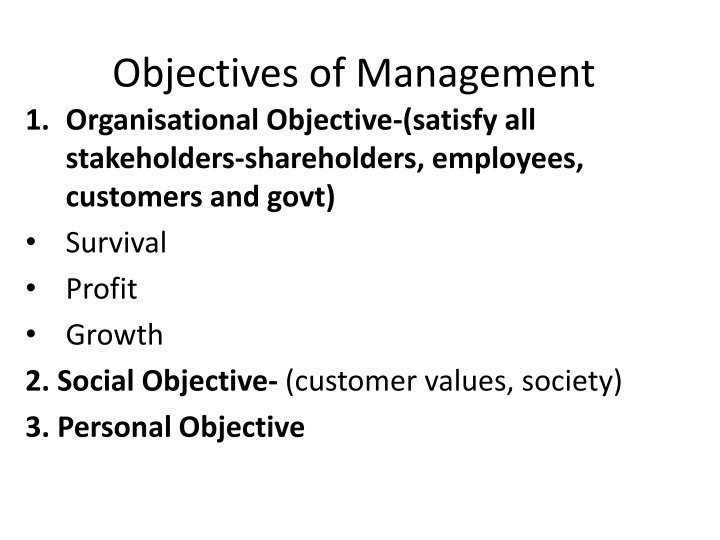
Management Objectives, Importance, and Case Study Analysis
Learn about the objectives of management, the importance of effective management practices, and a case study analysis of Mega Ltd.'s strategic decisions to achieve organizational goals. Explore how management aims to satisfy stakeholders, increase efficiency, and contribute to society while balancing personal and social objectives.
Download Presentation

Please find below an Image/Link to download the presentation.
The content on the website is provided AS IS for your information and personal use only. It may not be sold, licensed, or shared on other websites without obtaining consent from the author. If you encounter any issues during the download, it is possible that the publisher has removed the file from their server.
You are allowed to download the files provided on this website for personal or commercial use, subject to the condition that they are used lawfully. All files are the property of their respective owners.
The content on the website is provided AS IS for your information and personal use only. It may not be sold, licensed, or shared on other websites without obtaining consent from the author.
E N D
Presentation Transcript
Objectives of Management 1. Organisational Objective-(satisfy all stakeholders-shareholders, employees, customers and govt) Survival Profit Growth 2. Social Objective- (customer values, society) 3. Personal Objective
Importance of Management 1. Management helps in achieving group goals: 2. Management increases efficiency 3. Management creates a dynamic organisation 4. Management helps in achieving personal objectives 5. Management helps in the development of society
Case Study Mega Ltd. manufactured water-heaters. In the first year of its operations, the revenue earned by the company was just sufficient to meet its costs. To increase the revenue, the company analysed the reasons behind the less revenues. After analysis, the company decided: to reduce the labour costs by shifting the manufacturing unit to a backward area where labour was available at a very low rate. to start manufacturing solar water-heaters and reduce the production of electric water- heaters slowly. This will not only help in covering the risks but also help in meeting other objectives. Identify and explain the objectives of management discussed above. State any two values which the company wanted to communicate to society. 1.
Case Study The objectives of management discussed above are: Organisational objectives: An organisation strives to achieve multiple organizational objectives in the interest of its stakeholders like owners, employees etc.The main organizational objectives are survival, profit and growth. Social Objectives: It is the obligation of every organisation to undertake such activities which will benefit the society at large like using eco-friendly methods, contributing towards weaker sections of the society, generating employment opportunities, promoting literacy etc. The two values that the company wanted to communicate to the society are: Rural development Environment sustainability
Nature of Management 1. Management an art- Art is the skillful and personal application of existing knowledge to achieve desired results. It can be acquired through study, observation and experience. Existence of theoretical knowledge Personalised application Based on practice and creativity
Nature of Management 2. Management an a science- Science is a systematised body of knowledge that explains certain general truths or the operation of general laws. Systematised body of knowledge Principles based on experimentation Universal validity
Nature of Management 3. Management as a profession- Well-defined body of knowledge Restricted entry Professional association Ethical code of conduct Service motive
Levels of Management 1. Top Management: chairman, the chief executive officer, chief operating officer, president and vice-president. Overall welfare and survival of org. Analyse biz environment and implications Formulate org. and strategies
Levels of Management 2. Middle Management: middle level managers Interpret policies Ensure necessary staffs assign necessary duties and responsibilities to them, motivate them to achieve desired objectives, co-operate with other departments for smooth functioning of the organisation
Levels of Management 2. Operational Management: Foremen and supervisors They interact with the actual work force and pass on instructions of the middle management to the workers. Through their efforts quality of output is maintained, wastage of materials is minimised and safety standards are maintained. The quality of workmanship and the quantity of output depends on the hard work, discipline and loyalty of the workers.
Levels of Management-CaseStudy Ashutosh Goenka was working in Axe Ltd. , a company manufacturing air purifiers. He found that the profits has started declining from the last six months. Profit has an implication for the survival of the firm, so he analysed the business environment to find out the reasons for this decline. Identify the level of management at which Ashutosh Goenka was working. State three other functions being performed by Ashutosh Goenka. Answer: Ashutosh Goenka was working at top level of management. The three functions being performed by him at this level are outlined below: He is responsible for formulating the overall organizational goals and strategies. He is responsible for all the business activities and its impact on society. He has to coordinate the activities of different departments in pursuit of common goals.
Levels of Management-CaseStudy Ramarjuna joins an IT firm as a system analyst after completing his masters in Computer Science. As the nature of his work demands he has to work in very close coordination with all the departmental heads in the firm, very soon Ramarjuna realizes that each departmental head has own individual style of working. They differ greatly in their day-to- day approach to work. They tend to deal with a given situation, an issue or a problem through a combination of their own experience, creativity, imagination, initiative and innovation. In the context of the above case: Identify and explain the nature of management highlighted in the above case. Answer: In the above case, management is being considered as an art. Art is the skillful and personal application of existing knowledge to achieve desired results. The evaluation of management as an art is given below: Existence of theoretical knowledge: Art presupposes the existence of certain knowledge. Management fulfills this criterion as there exist a number of theories and principles on management which have been formulated by various management experts. Personalised applications: Art is a personalised concept. Management fulfills this criterion as a good manager works through a combination of his own experience, creativity, imagination, initiative and innovation to carry out the assigned work. Based on practice and creativity: All art is practical. Management fulfills this criterion as a person becomes a better manager with constant practice and experience. This also leads to emergence of different styles of management.
Levels of Management-CaseStudy Mr. Nitin Singhania s father has a good business of iron and steel. He wants to go to the USA for his MBA but his father thinks that he should join the business. On the basis of emerging- trends, do you think that Mr. Singhania should send his son to the USA? Give any three reasons in support of your answer. Answer: Yes, according to me, Mr. Singhania should send his son to USA for his MBA because management is being recognised as a profession to a great extent because of the following reasons: Well defined body of knowledge: Management is considered to be a well-defined body of knowledge that can be acquired through instructions. As a separate discipline, it contains a set of theories and principles formulated by various management experts. Moreover, it is taught in various schools and colleges all over the world. Ethical code of conduct: Management, in practice, like other professions, is bound by a code of conduct which guides the behaviour of its members. Therefore, acquiring a degree in management will equip him with the good managerial,, skills and approach. Service motive: A good management course will provide him an insight into the multiple goals that an organisation should pursue. This knowledge will help him to serve both the objectives of profit maximization and social welfare effectively for his company.






















